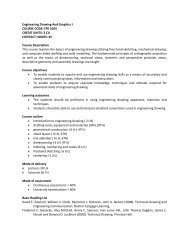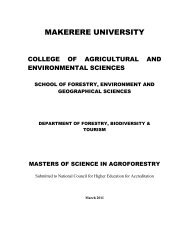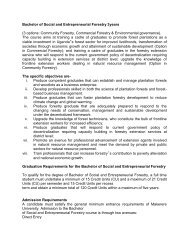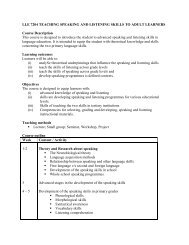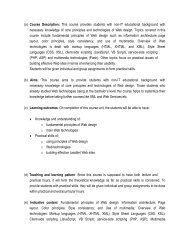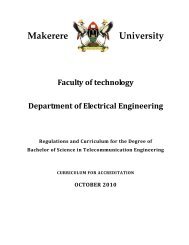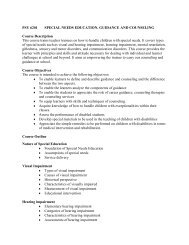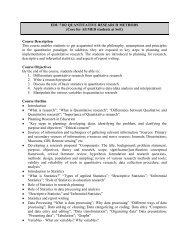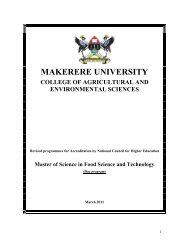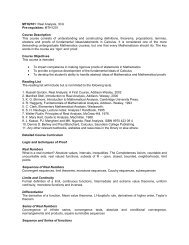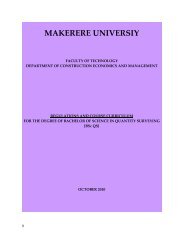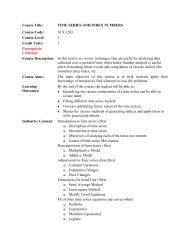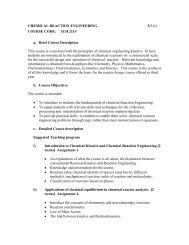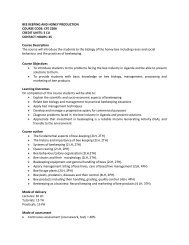MAKERERE UNIVERSITY - Office of the Academic Registrar ...
MAKERERE UNIVERSITY - Office of the Academic Registrar ...
MAKERERE UNIVERSITY - Office of the Academic Registrar ...
You also want an ePaper? Increase the reach of your titles
YUMPU automatically turns print PDFs into web optimized ePapers that Google loves.
Jackson, Mary V. 1989. Engines <strong>of</strong> Instruction, Mischief, and Magic: Children's Literature inEngland from Its Beginning to 1839. Lincoln: University <strong>of</strong> Nebraska Press.Karin, L. 2004. Children‟s Literature: New Approaches. Basingstoke: Palgrave.Muir, Percy. 1954. English Children's Books. London: B.T. Batsford.Silvey, Anita, ed. 1995. Children's Books and Their Creators. Boston: Houghton Mifflin.Thwaite, Mary F. 1963. From Primer to Pleasure in Reading. Boston: The Horn Book.Townsend, John Rowe. 1974. Written for Children: An Outline <strong>of</strong> English-Language Children'sLiterature. New York: J. B. Lippincott.Watson, Victor, ed. 2001. The Cambridge Guide to Children's Books in English. Cambridge,UK: Cambridge University Press.LLE 7206: INTEGRATING ORAL LITERATURE IN SCHOOL CURRICULACourse Description:Oral Literature is one ligament <strong>of</strong> literature that is currently finding its place in <strong>the</strong> secondaryschool curriculum. This course aims at designing possible ways in which oral literature can fitwithin <strong>the</strong> structure <strong>of</strong> <strong>the</strong> curriculum while at <strong>the</strong> same time maintaining its major characteristic<strong>of</strong> performance. The National Curriculum Development Centre released a literature curriculumin 2009 and suggested that oral literature is one <strong>of</strong> <strong>the</strong> components <strong>of</strong> literature that could betaught in <strong>the</strong> lower secondary grades. This course reflects on this development and it involves <strong>the</strong>basics <strong>of</strong> oral literature and its sustainability in a multilingual classroom.Learning OutcomesLearners will be able to:i) conduct research in oral literatureii) select and design oral literature texts to use in different gradesiii) integrate oral literature in <strong>the</strong> language and o<strong>the</strong>r literature classesiv) make collections <strong>of</strong> various oral literature texts for reference purposesv) applyObjectivesThis course will equip learners with:i) more knowledge about oral literatureii) <strong>the</strong> ability to teach oral literature at various secondary school levelsiii) skills to critique oral literature texts visa vis <strong>the</strong> needs/background <strong>of</strong> <strong>the</strong> learnersiv) ability to teach oral literature without losing <strong>the</strong> core features like performancev) performance skills …..ContentLearners will revise <strong>the</strong> nature <strong>of</strong> oral literature and discuss its importance in <strong>the</strong> secondaryschool curriculum. The secondary school syllabus will provide <strong>the</strong> basis <strong>of</strong> fitting oral literature51



